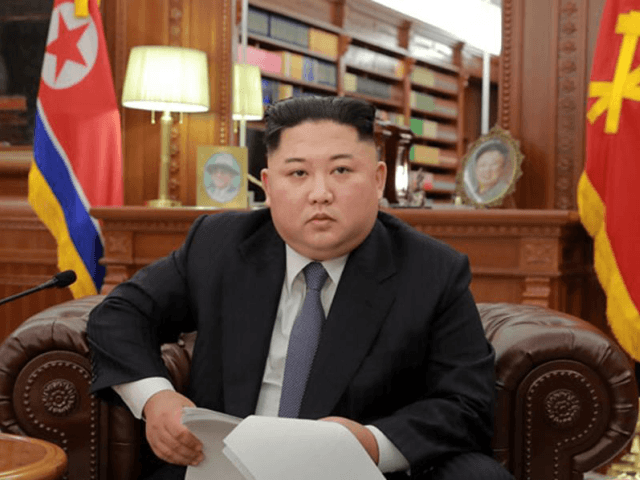North Korea’s Foreign Ministry issued a statement Sunday declaring its support for “the independent will and decision of the government and people of Venezuela,” without explicitly identifying ally and dictator Nicolás Maduro as the president of the country.
Venezuela’s National Assembly, the only democratic institution left in the country, ousted Maduro as president on January 23 as required by the nation’s constitution. The president of the Assembly, Juan Guaidó, took an oath of office to become the nation’s interim president that day. Dozens of countries, including most in Latin America, have accepted Guaidó as Venezuela’s legitimate president and refused to conduct relations with Maduro’s representatives.
The communist regime of North Korea, one of Maduro’s closest allies in the region, had issued a statement shortly after Guaidó’s inauguration promising to “strengthen solidarity and cooperation with socialist countries,” but had not explicitly backed Maduro. The statement Sunday is the closest to clear support for the socialist regime – as it mentions support for an “elected” president – but falls short of personally naming Maduro, only supporting “the government and people of Venezuela.”
Adding to the confusion is that North Korea’s statement to maintain “cooperation with socialist countries” may not necessarily exclude the new Venezuelan government, as Guaidó is a founding member of Popular Will, a member party of the Socialist International (SI). Guaidó’s first policy proposal, the “Plan País,” is a sprawling social safety net program relying on Venezuela’s ample oil reserves, controlled by the state, to fund initiatives for the poor.
“An abnormal situation developed in Venezuela where the speaker of the parliament declared null and void the result of the presidential election held in last May and claimed himself as provisional president on January 23,” the North Korean Foreign Ministry said in its statement. “The situation in Venezuela is developing into a complicated international issue.”
“Any attempt by outside forces to remove a president legitimately elected according to the constitution of a sovereign state is an undisguised interference in internal affairs and a wanton violation of international law,” the statement continued. “It is our firm stand that Venezuelan issues should be resolved in a peaceful way in accordance with the independent will and decision of the government and people of Venezuela.”
As Guaidó was never elected, the statement appears to support Maduro as a “legitimately” elected president. Maduro staged an election in May 2018, banning opposition candidates from running and using roving socialist gangs to intimidate voters. Over 80 percent of eligible Venezuelans did not participate in that election. At the time, North Korea’s state newspaper Rodong Sinmun published a screed condemning the United State for its “sinister bad habit” of pointing out that this election was not legitimate.
Prior to the Foreign Ministry statement Sunday, North Korean ambassador to Venezuela Ri Song Gil expressed a desire on the part of Pyongyang to “strengthen solidarity and cooperation with socialist countries in accordance with the ideology of self-reliance, peace and good will” and to “expand ties” to Venezuela specifically. Ri did not mention Maduro by name.
The language in North Korea’s statements echoes that of its neighbor and most powerful benefactor, the Chinese Communist Party, in avoiding explicit support for Maduro. The Chinese Foreign Ministry refused to give a definitive answer on if Maduro was the legitimate president of Venezuela on multiple occasions, instead condemning those who support Guaidó for being interventionists.
“The Venezuela’s [sic] affairs must be and can only be chosen and decided by the Venezuelan people,” Chinese Foreign Ministry spokeswoman Hua Chunying told reporters shortly after Guaidó’s inauguration. “China is opposed to foreign interference in Venezuela’s affairs, threatening to use military intervention in particular.”
Hua’s language contrasted significantly with that of Russia’s foreign ministry, which vocally expressed support for Maduro.
“Together with other responsible members of the international community, we will do everything to support President Maduro’s legitimate government in upholding the Venezuelan constitution and employing methods to resolve the crisis that are within the constitutional framework,” Russian Foreign Minister Sergey Lavrov said last week. As for Guaidó, “the leaders of the opposition movement who have declared ‘dual power’ are in fact receiving instructions from Washington.”
North Korea signed new trade deals with Venezuela as recently as this November when Maduro welcomed senior North Korean official Kim Yong Nam to Caracas. Neither government offered any clarity on the content of the political and economic agreements signed.

COMMENTS
Please let us know if you're having issues with commenting.